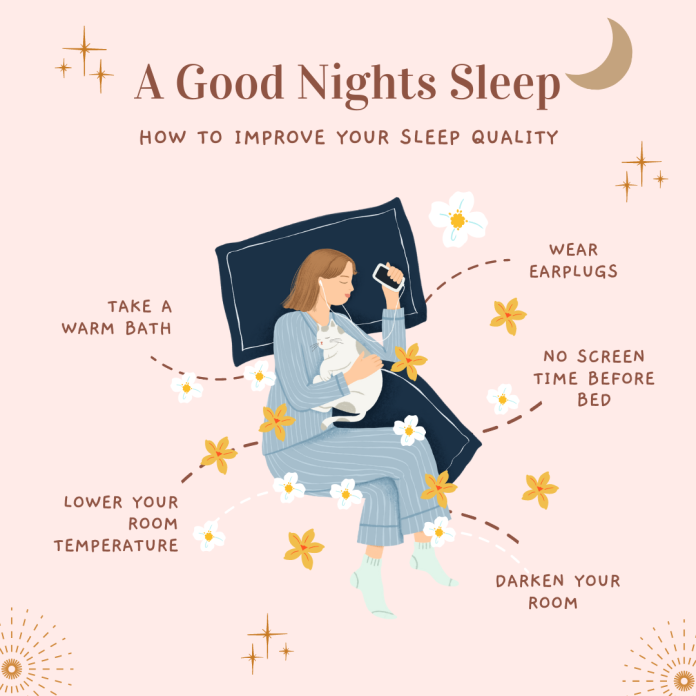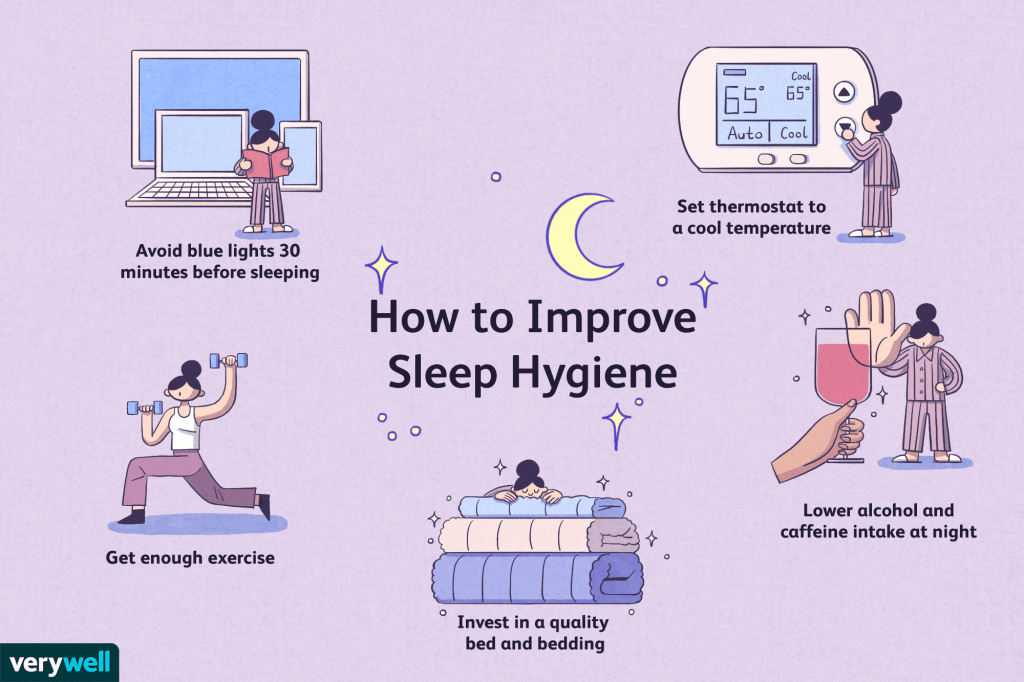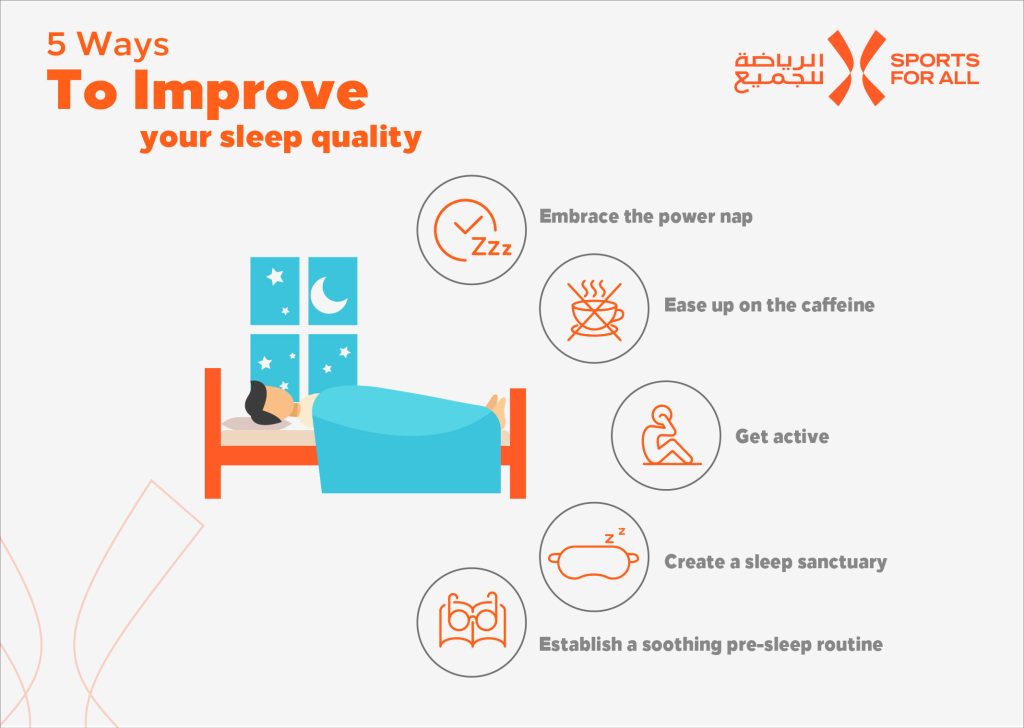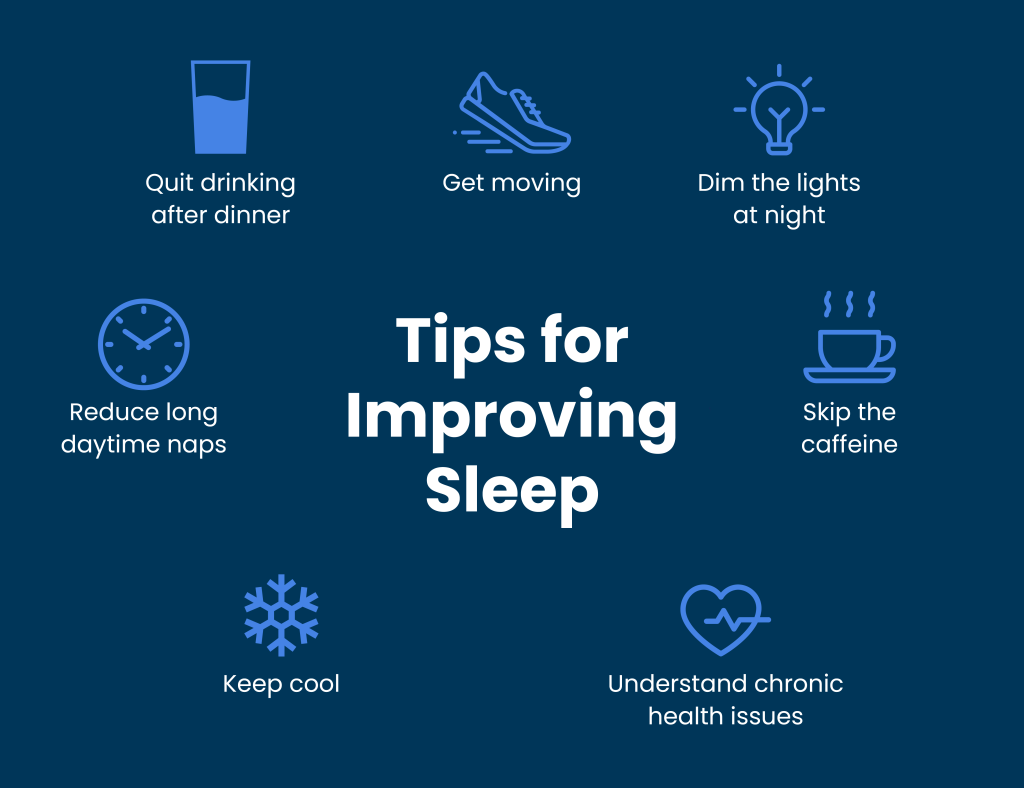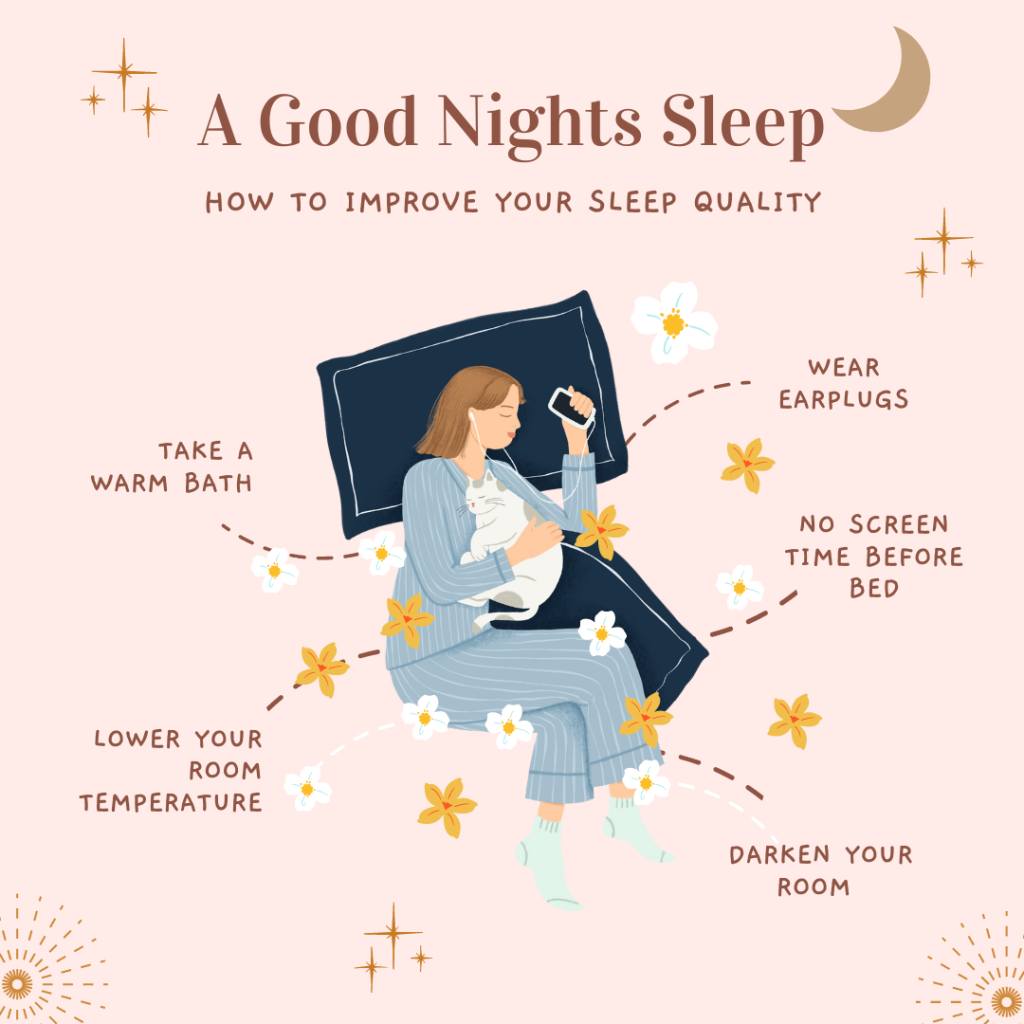If you find yourself tossing and turning at night, wondering how to improve your sleep quality, you’re not alone.
Restful sleep is essential for our overall well-being, yet many struggle to achieve it.
Luckily, there are simple steps you can take to enhance the quality of your sleep and wake up feeling refreshed and rejuvenated each morning.
From creating a soothing bedtime routine to making your sleep environment more conducive to rest, this article will explore various strategies to help you improve your sleep quality and enjoy the restful slumber you deserve.
Review contents
Establish a Regular Sleep Schedule
Go to bed and wake up at the same time.
To improve your sleep quality, it’s essential to establish a regular sleep schedule that involves going to bed and waking up at the same time every day, even on weekends.
This consistency helps regulate your internal body clock, known as the circadian rhythm, which is crucial in regulating sleep-wake cycles.
By adhering to a consistent schedule, your body will become accustomed to the designated sleep and wake times, ultimately enhancing the overall quality of your sleep.
Avoid napping during the day.
While a short power nap can sometimes be beneficial, excessive daytime napping can disrupt your nightly sleep routine. If you find it difficult to fall asleep or stay asleep at night, it may be advisable to avoid napping altogether.
This ensures that you will be more tired when it’s time for bed, increasing the likelihood of falling asleep faster and experiencing a more restful sleep at night.
Create a bedtime routine.
One effective way to improve sleep quality is by implementing a relaxing bedtime routine. Engaging in consistent pre-sleep activities signals your body that it’s time to wind down and prepare for sleep.
Some activities you might consider including in your routine are reading a book, listening to calming music, or practicing mindfulness exercises like meditation or deep breathing. By establishing a regular bedtime routine, you can train your mind and body to relax and transition into a restful state, promoting a higher quality sleep.
Create a Sleep-Friendly Environment
Make your bedroom comfortable and conducive to sleep
The environment in which you sleep can significantly impact the quality of your sleep. It is essential to create a sleep-friendly atmosphere in your bedroom. Start by ensuring that your bed and pillows are comfortable and supportive.
Invest in a quality mattress that suits your preferences, and consider replacing old, worn-out pillows. By creating a comfortable sleeping surface, you can reduce the likelihood of experiencing discomfort or pain that may disrupt your sleep.
Keep your bedroom calm, dark, and quiet.
Creating a relaxed, dark, and quiet environment in your bedroom is vital to optimize your sleep quality. Use blackout curtains or blinds to block out any external light sources that may interfere with your sleep.
Additionally, consider using earplugs or a white noise machine to drown out disturbing noises. Maintaining a cool room temperature between 60 and 67 degrees Fahrenheit (15 to 19 degrees Celsius) can help facilitate a more comfortable and restful sleep.
Remove electronic devices from the bedroom.
Electronic devices emit blue light, which can interfere with your body’s natural production of melatonin, a hormone that helps regulate sleep.
Removing electronic devices such as smartphones, tablets, and televisions from your bedroom is advisable to improve your sleep quality.
The blue light emitted by these devices can disrupt your circadian rhythm and make falling asleep harder. Instead, create a screen-free zone in your bedroom that promotes relaxation and restfulness.
Manage Your Exposure to Light
Get natural sunlight during the day.
Exposure to natural sunlight during the day can positively impact your sleep quality. Natural light helps regulate your circadian rhythm and can improve your mood and alertness.
Make an effort to spend time outside during daylight hours, whether going for a walk, sitting by a window, or enjoying outdoor activities. Exposure to natural light can enhance your sleep-wake cycle and promote more restful sleep at night.
Reduce bright lights in the evening.
Reducing exposure to bright lights is essential in the evening and up to bedtime. Bright lights can suppress melatonin production, making it harder for you to fall asleep.
Dim the lights in your home as you wind down for the evening to signal to your body that it is time to sleep. Consider using soft, warm-colored lighting in your bedroom to create a calming atmosphere that supports relaxation and optimal sleep quality.
Limit screen time before bed.
The blue light emitted by electronic devices has been found to interfere with sleep quality. To improve your sleep, limiting your screen time in the hours leading up to bedtime is recommended.
Instead of scrolling through your phone or watching TV, engage in activities that promote relaxation, such as reading a book, practicing a hobby, or spending quality time with loved ones. This screen-free time allows your brain to unwind and prepares it for restful sleep.
Consider using blue light filters.
If reducing screen time before bed is challenging, consider using blue light filters on your electronic devices. These filters can help reduce the amount of blue light emitted, making it less disruptive to your sleep.
Many smartphones, tablets, and computers offer built-in blue light filter settings that you can activate in the evening. Additionally, there are also external blue light filter glasses or screen protectors available that can be used to minimize exposure to blue light.
Practice Relaxation Techniques
Engage in regular exercise.
Regular exercise has numerous benefits, and improved sleep quality is one of them. Physical activity during the day can help you fall asleep faster and enjoy a deeper, more restorative sleep.
Aim for at least 30 minutes of moderate-intensity exercise most days of the week. However, avoid exercising too close to bedtime, as the increased body temperature and heart rate may make it harder to fall asleep.
Try meditation or deep breathing exercises.
Meditation and deep breathing exercises are effective relaxation techniques that help calm your mind and prepare your body for sleep.
Consider incorporating these practices into your bedtime routine to quiet racing thoughts and induce relaxation. Find a quiet, comfortable space, close your eyes, and focus on your breath. These mindfulness exercises can alleviate stress and anxiety, promoting a more peaceful and restful sleep.
Use relaxation techniques such as progressive muscle relaxation
Progressive muscle relaxation is a technique that involves tensing and relaxing each muscle group in your body to release tension and promote relaxation.
Start by tensing a specific muscle group, such as your hands, for a few seconds, then release the tension and feel the muscle relax. Move from one muscle group to another, progressively working through your body. This technique can help alleviate physical tension and promote a calmness conducive to sleep.
Create a peaceful bedtime routine.
In addition to practicing relaxation techniques, a peaceful bedtime routine can significantly improve sleep quality. Consider incorporating activities that help you unwind, such as taking a warm bath or shower, practicing gentle stretching or yoga, or enjoying caffeine-free herbal tea.
Combining these soothing activities can signal to your body and mind that it’s time to relax and prepare for a restful night’s sleep.
Evaluate Your Diet and Caffeine Intake
Avoid heavy meals close to bedtime.
Eating heavy meals, especially right before bed, can lead to discomfort and indigestion, making it challenging to fall asleep and stay asleep. It is advisable to avoid consuming large meals within a few hours of your designated bedtime.
Instead, choose lighter, balanced meals combining lean protein, whole grains, and fruits and vegetables. This gives your body enough time to digest the food properly, enhancing sleep quality.
Limit caffeine intake, especially in the afternoon
Caffeine is a stimulant that can interfere with your ability to fall asleep. Limiting your caffeine intake, particularly in the afternoon and evening hours is recommended.
Pay attention to the sources of caffeine in your diet beyond coffee, such as tea, soda, energy drinks, and even some medications. Opt for decaffeinated or caffeine-free alternatives to reduce the impact of caffeine on your sleep quality.
Avoid excessive alcohol consumption.
While alcohol can initially induce drowsiness, it can hurt the overall quality of your sleep. Alcohol disrupts your sleep cycle, leading to fragmented and less restorative sleep.
It is advisable to limit alcohol consumption incredibly close to bedtime to ensure a more restful and rejuvenating sleep. Instead, opt for non-alcoholic beverages, herbal teas, or warm milk to promote relaxation and enhance sleep quality.
Consider herbal teas or sleep-friendly foods.
Certain foods and drinks can naturally support better sleep quality. Herbal teas like chamomile, valerian root, and lavender can have calming effects on the body, making them suitable choices to incorporate into your evening routine.
Additionally, foods rich in tryptophan, such as turkey, nuts, seeds, and dairy products, can help increase the production of serotonin, a neurotransmitter in regulating sleep. Including these sleep-friendly foods and beverages in your diet can improve sleep quality.
Establish a Pre-Sleep Ritual
Avoid stimulating activities before bed.
Engaging in stimulating activities, such as intense exercise, mentally challenging tasks, or exciting conversations close to bedtime, can make it harder for your mind and body to wind down.
Avoid activities that trigger alertness and instead opt for more calming and relaxing pursuits in the hours leading up to sleep. By avoiding stimulating activities, you can create an environment that promotes a smoother transition into sleep.
Read a book or listen to calming music.
Reading a book or listening to calming music before bed can be an excellent way to relax your mind and prepare for sleep. Choose reading material that isn’t overly stimulating; the goal is to calm your mind.
Similarly, opt for soft, soothing music that helps quiet your thoughts and induces relaxation. These activities can serve as pleasant distractions, allowing your mind to shift focus away from daily stressors and promoting a peaceful transition into sleep.
Take a warm bath or shower.
Taking a warm bath or shower before bed can help relax your muscles and create a sense of tranquility in your body. The warm water can help lower your body temperature, which naturally rises and falls throughout the day and significantly regulates sleep.
This pre-sleep ritual can effectively ease tension and stress accumulated throughout the day, allowing you to unwind and prepare for a restful night’s sleep.
Write in a journal to unload your thoughts.
If you find that your mind is often racing with thoughts and concerns when you lie down to sleep, writing in a journal can be a helpful practice to unload your thoughts and promote a sense of mental clarity.
Spend a few minutes before bed jotting down any worries, tasks, or reflections from the day. Transferring thoughts onto paper can provide relief and closure, allowing your mind to quiet down and be more at ease as you prepare to sleep.
Create a Comfortable Sleep Environment
Choose appropriate bedding and sleepwear.
The comfort of your bedding and sleepwear can influence the quality of your sleep. Opt for bedding materials that suit your preferences, such as cotton or linen sheets that promote breathability.
Choose a pillow that adequately supports your neck and head, aligning your spine correctly. Additionally, select comfortable and non-restrictive sleepwear, allowing for freedom of movement during the night. By creating a comfortable sleep environment, you can optimize your sleep quality.
Make sure the temperature is comfortable.
The temperature of your bedroom plays a significant role in your sleep quality. Each person may have different temperature preferences for sleep, but keeping your bedroom cool between 60 and 67 degrees Fahrenheit (15 to 19 degrees Celsius) is generally recommended.
Experiment with different temperatures until you find the one that allows you to sleep comfortably. Using breathable bedding, adjusting thermostat settings, or using a fan can help create the ideal sleep environment for your comfort.
Keep noise levels down.
Excessive noise can disrupt your sleep and reduce the overall quality of your rest. If you live in a noisy environment, consider using earplugs, a white noise machine, or a fan to drown out disruptive sounds.
Alternatively, soothing sounds such as nature recordings or gentle music can contribute to a peaceful sleep environment by masking background noise and creating a calming atmosphere conducive to better sleep quality.
Address any issues that disrupt your sleep, such as snoring or allergies
If you frequently experience sleep disruptions due to snoring, allergies, or other issues, addressing and managing these factors is important to improve your sleep quality. Snoring can be caused by various factors, such as sleep position or underlying health conditions, and may require consultation with a healthcare professional.
Additionally, if allergies affect your sleep, consider using allergy-proof bedding and air purifiers or seeking medical advice for optimal solutions. Addressing these issues can create a sleep environment conducive to a peaceful and uninterrupted night’s rest.
Manage Your Stress Levels
Practice stress-reducing activities during the day
High levels of stress can significantly impact your sleep quality. Actively managing your stress during the day can help promote better sleep at night.
Engage in stress-reducing activities such as regular exercise, taking breaks throughout the day, practicing mindfulness or meditation, or pursuing hobbies that bring you joy.
By incorporating stress-reducing activities into your daily routine, you can create a healthier mindset and reduce the likelihood of stress interfering with your sleep.
Find healthy ways to cope with stress.
Everyone copes with stress differently, and finding healthy coping mechanisms can positively impact your sleep quality. Experiment with stress management techniques such as journaling, talking to a trusted friend or family member, engaging in creative outlets like art or music, or seeking professional help through therapy or counseling.
Finding healthy ways to cope with stress can reduce its impact on your sleep while improving your overall well-being.
Avoid stimulating discussions or arguments before bed
Stimulating or argumentative conversations before bed can increase stress levels and make relaxing difficult.
To promote better sleep, avoid engaging in heated discussions or debates in the hours leading up to bedtime. Instead, foster a calm and peaceful atmosphere in your evening routine, setting the stage for a more tranquil and restful night’s sleep.
Consider therapy or counseling if stress is affecting your sleep
If stress continues to impact your sleep quality and overall well-being significantly, seeking professional help through therapy or counseling may be beneficial. A licensed mental health professional can provide guidance and tools to help you effectively manage and reduce stress.
Therapy or counseling sessions can equip you with coping strategies and techniques specific to your needs, ultimately improving your ability to relax and experience higher-quality sleep.
Limit Daytime Napping
Avoid long naps or napping late in the day.
While daytime napping can benefit some individuals, excessive daytime napping or napping too close to bedtime can interfere with your ability to fall asleep and stay asleep at night.
Avoid taking long naps or napping late in the day, as this can disrupt your circadian rhythm and reduce your sleep drive. If you need to nap, opt for short power naps of no longer than 20 minutes early in the afternoon to avoid interfering with your nighttime sleep.
Keep napping sessions short.
If you find it challenging to get through the day without napping, keep your daytime napping sessions short and strategic.
Limiting your naps to 20 minutes or less can help prevent you from falling into deep sleep, ensuring you remain alert and ready for sleep at night. Set an alarm or establish a routine to prevent excessive napping, allowing your body to maintain a healthy sleep-wake cycle.
Create a regular sleep schedule to reduce the need for daytime napping
As mentioned earlier, establishing a regular sleep schedule can help reduce the need for daytime napping.
You can set a stable sleep pattern that promotes adequate nighttime sleep by consistently going to bed and waking up at the exact times each day. By prioritizing and maintaining a regular sleep schedule, you can diminish daytime drowsiness and minimize the desire to nap during the day.
Seek Professional Help if Needed
Consult a healthcare professional for persistent sleep issues
If you consistently experience difficulties with sleep and none of the above strategies have significantly improved your sleep quality, it may be time to consult a healthcare professional.
A medical professional can assess your sleep issues, evaluate potential underlying causes, and recommend appropriate interventions or treatments tailored to your needs. Seeking professional guidance is particularly important if your sleep issues affect your daily functioning, quality of life, or overall health.
Consider undergoing a sleep study.
Sometimes, a healthcare professional may recommend a sleep study to investigate and diagnose any potential sleep disorders.
A sleep study involves monitoring various aspects of your sleep, such as brainwaves, breathing patterns, and body movements, to gather objective data about your sleep quality.
This information can help identify underlying issues and guide treatment options that significantly improve your sleep quality and overall well-being.
Explore potential underlying medical conditions.
Numerous medical conditions, such as sleep apnea, insomnia, restless leg syndrome, and others, can impact sleep quality.
If you suspect that an underlying medical condition may contribute to your sleep issues, discussing your concerns with a healthcare professional is essential. They can evaluate your symptoms, order necessary tests, and provide appropriate treatment or referrals to specialists who can help manage the underlying condition.
Discuss medications or supplements with a doctor.
Certain medications or dietary supplements can affect your sleep quality. If you are taking any prescription medications or over-the-counter supplements, discussing them with your healthcare provider is essential.
Some medications may disrupt sleep patterns or have side effects impacting your ability to fall or stay asleep. Your doctor can guide you on adjusting dosages, changing medications, or exploring alternative approaches to support better sleep while effectively managing your health conditions.
In conclusion, improving sleep quality involves implementing various strategies and creating a sleep-friendly environment. Establishing a regular sleep schedule, optimizing your sleep environment, managing exposure to light, practicing relaxation techniques, evaluating diet and caffeine intake, establishing a pre-sleep ritual, creating a comfortable sleep environment, managing stress levels, limiting daytime napping, and seeking professional help when needed are all pivotal steps you can take to enhance your sleep quality. Remember, prioritizing your sleep is vital for overall health and well-being, so don’t hesitate to make the necessary adjustments and create a bedtime routine that works best for you.

